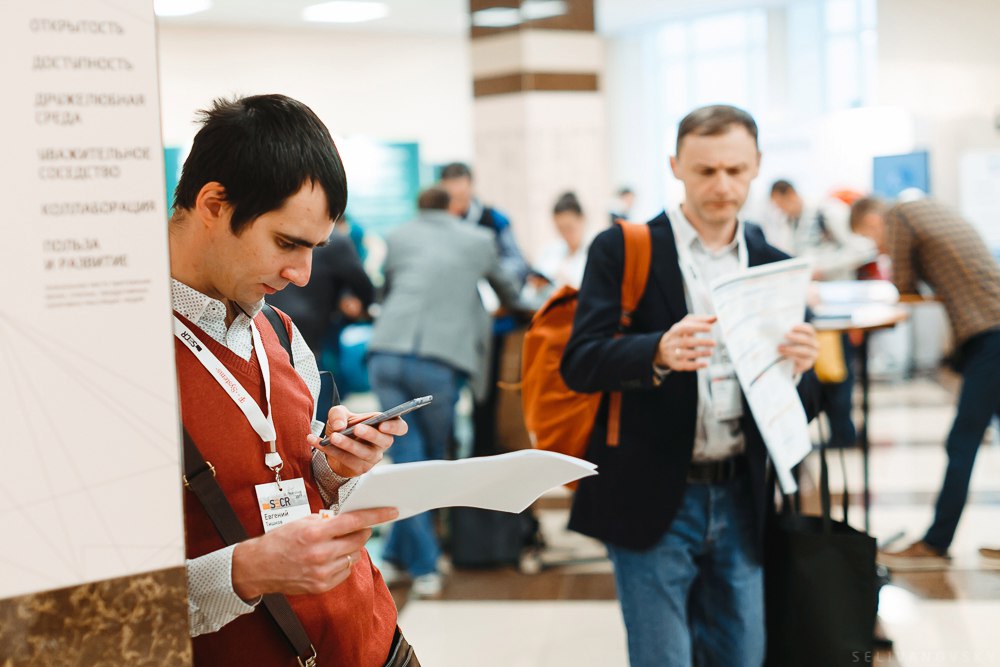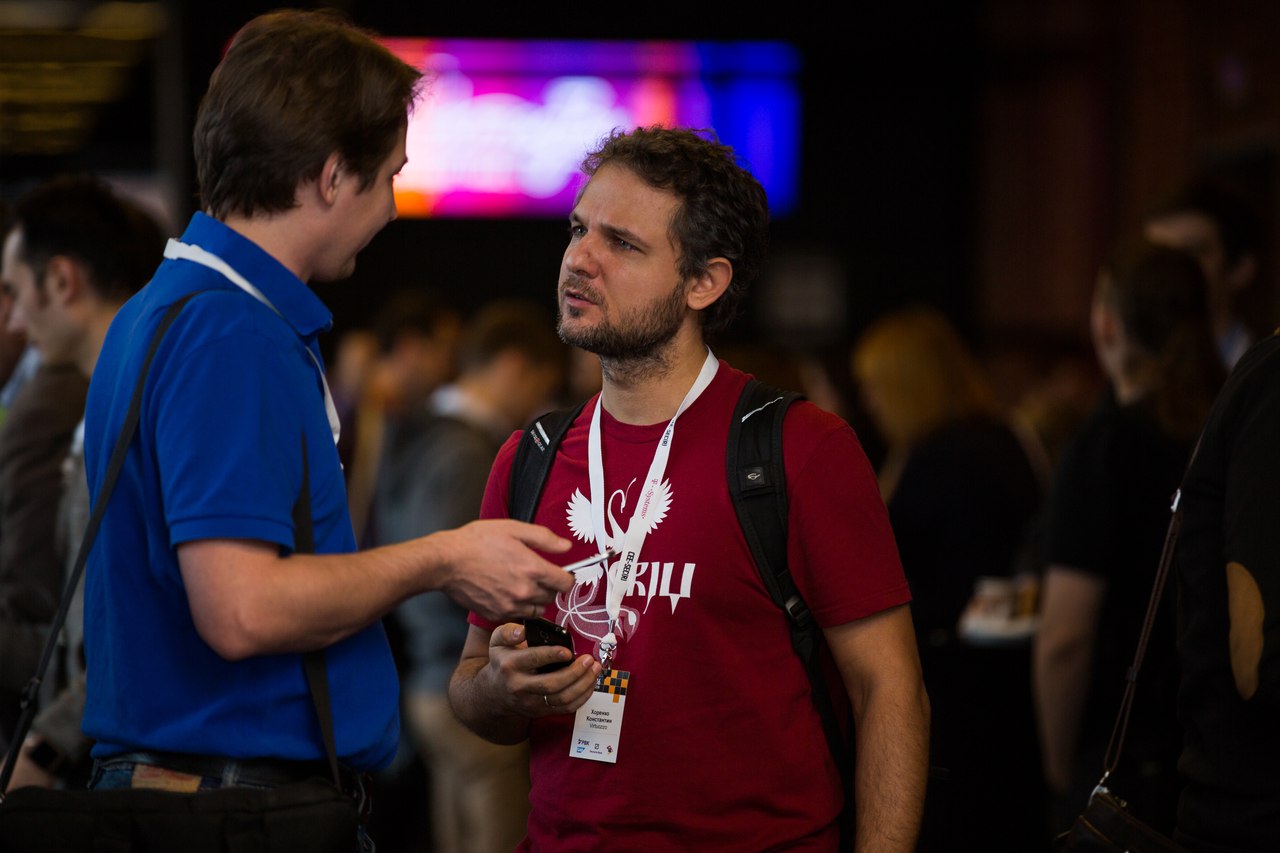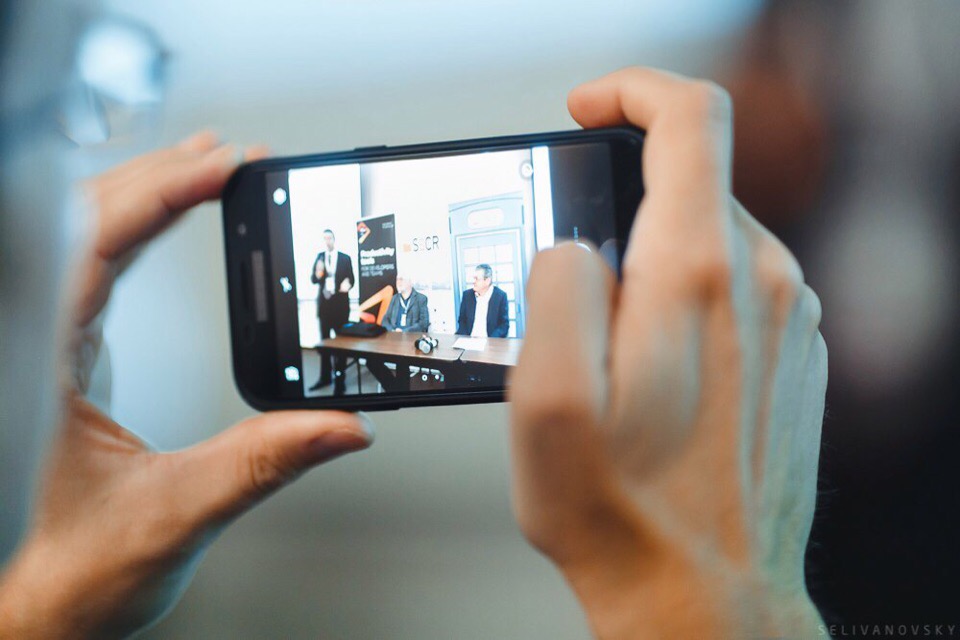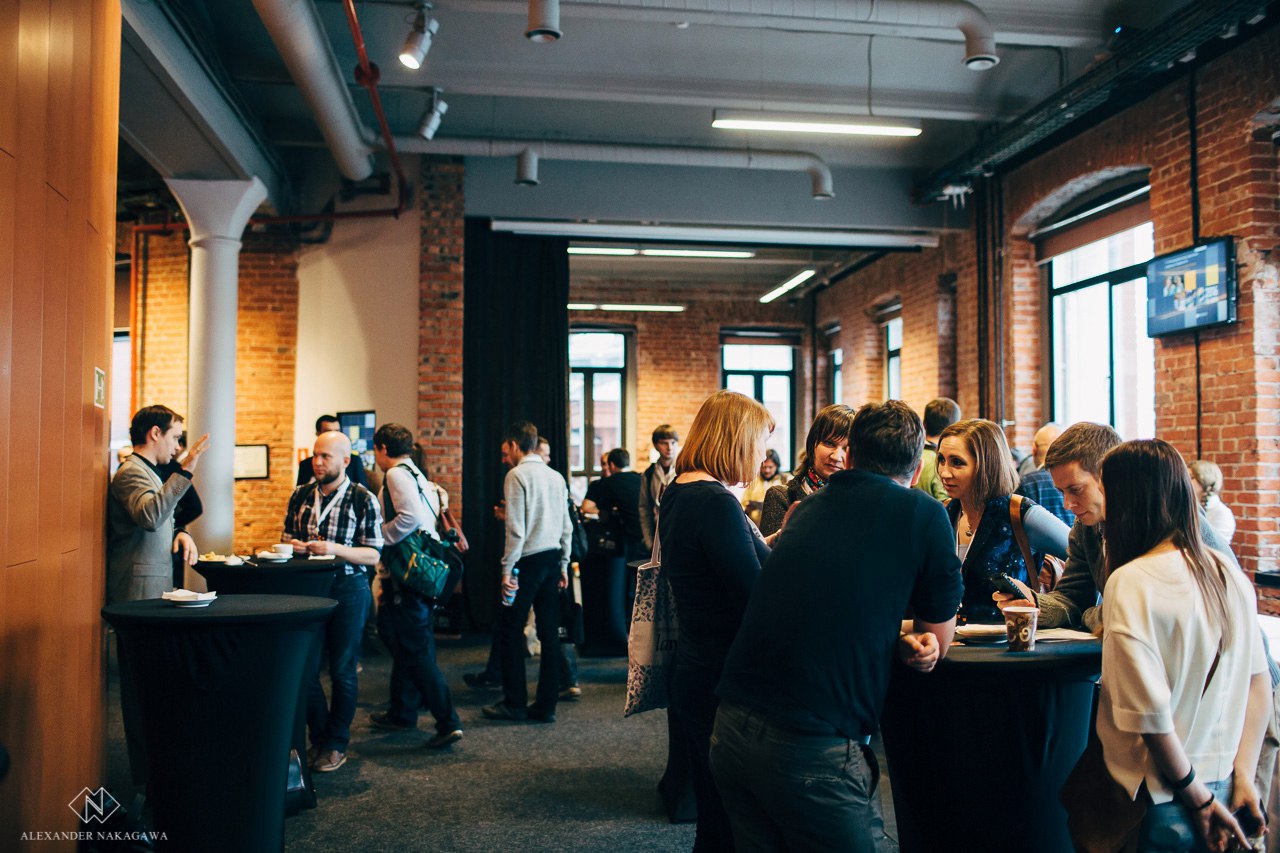How to get the most out of the conference
The question of the benefits and necessity of attending IT conferences is often controversial. For several years now I have been involved in organizing several major events and want to share some tips on how to do so in order to get the most out of the event and not worry about a lost day.
If you think that “reports and speakers”, then this is not so. Rather, not only. In addition to the program, it is also a "party" of like-minded people. Like-minded, active and interested in what is happening. Where, if not in such a place, talk about the profession, discuss cases, projects, nuances of work. In such lively conversations, completely new ideas are born. Thanks to a change of atmosphere, new faces, fresh thoughts, the conference is a source of inspiration. And if it also takes place in another city - generally a mini-vacation. And it is not necessary to dismiss the fact that the participation of an employee in an event is a good sign for an employer who talks about motivation and the desire to develop in a profession. And merit can directly affect the attitude to the employee, status, even the position or the sn.
So it turns out that we are going to the conference. And we get:
')
And, to get the maximum profit, we have to squeeze out of each item to the fullest.
Now, in order of how to do it.
Now big conferences offer several simultaneous tracks in the program. Consider the approach as you make your choice. You can either go to the reports on your subject and be pumped in it, or, on the contrary, choose areas adjacent to the main subject in order to learn fundamentally new things. You can focus on the subject, and you can on the company of the speaker, whose experience you are interested. Do not make a full schedule, mark in the program only those performances that you can not exactly miss, put reminders in the phone at the time of the presentations.
If during the report you understand that you are not “entering,” go to another room or go to get acquainted in the hall - do not waste time. In order not to disturb others, sit down at the side of the aisle. Do not bet on key and invited speakers. If their topic is not quite close to you, go to another track. Knowledge here is more important than the "star" speaker.

The speaker spoke, and here begins the most interesting - questions. Others are useful, but you need to ask your own. Try to think over the questions in advance, because you scheduled this report when you made a personal schedule. Here you also need to practice, because you need to know how to ask a question.
If in a nutshell: introduce yourself (name, company, position), express your point of view or describe very briefly how things are going on your project, so that the speaker understands the problem and then formulate the question. Avoid double meanings and use speaker terms. One good question from the listener can flow into the discussion in the lobby and a strong acquaintance. Often, the organizers make special areas of communication with speakers near each hall, so that the speaker can be easily found after the speech.
Most speakers are ideological and open-minded people. If you started communicating with the author, or you received recommendations for your work - find out how you can contact the speaker after the event. So you can ask additional questions later, share the results or continue the discussion already outside the conference.

Good ideas better fix immediately. To do this, the participant’s bags usually have a notebook and pen, or you can simply use the notes on the phone. The program of the event is full of speeches and communication, so by the end of the day everything heard can simply mix in my head. There is absolutely no sense in outlining reports, usually presentations of speeches are published fairly quickly on conference sites. They will help to more accurately remember what he heard, if necessary.

Learn about pre-party. Sometimes participants and speakers gather for small meetings before an event. This is a good opportunity to get acquainted in advance, to find a company for a conference or just to spend the evening if you come from another city. It makes sense to search for information about such meetings in the telegrams of the event, on the pages of social networks. Although such meetings are often spontaneous, ask the organizers that they should be monitored. Initiate the meeting yourself using the hashtag. If you are not pre-party, look for alternative points of informal communication: networking in a mobile application, telegram chat, social networks, etc.
The most original advice :) And yet, live conferences are a great way to acquire many useful contacts. And, by the way, quite often some cool prizes are played on sponsor stands for business cards. If you think that business cards - the last century, think about how to quickly exchange contacts. It is unlikely that this should be a personal phone - it will sink into a sea of similar phonebook entries, let it be social networking pages that are easy to find. In this case, the personal page should immediately talk about your type of activity so that you can easily be identified in the lists of friends and determine who you are if you stumble upon a profile after a while.

Events are not only useful information and dating, this is a great opportunity to escape from the daily routine. Look at your notes, remember which reports inspired you. What you heard can be implemented as early as next week? Begin to embody the received ideas, not shelving them in order not to lose the charge received.
But it's all about work. If you get a chance to go to a conference in another city or country, arrange a little vacation for yourself. Allocate time for a walk, take a trip on an excursion - explore the terrain!
As the speakers note - a great way to structure the information received is to pass it on to others. Tell us about the trip to your team, share the most useful things you learned. Use the presentations of the reports that you receive. And give recommendations, which performances are better to watch completely in the video when they appear.
And bosses will be more likely to go to events if you share fresh knowledge. You make several presentations - practice the speech, build up the material, and may already want to participate in the conference as a speaker, not a listener.

This is the most basic. But if you try to fulfill all the points, participation in the conference will definitely be useful and will become an effective way of gaining knowledge, new acquaintances and career advancement.
The list, I am sure, can be continued. Share what you have lifehacks to participate in events?
For a start, what is a conference
If you think that “reports and speakers”, then this is not so. Rather, not only. In addition to the program, it is also a "party" of like-minded people. Like-minded, active and interested in what is happening. Where, if not in such a place, talk about the profession, discuss cases, projects, nuances of work. In such lively conversations, completely new ideas are born. Thanks to a change of atmosphere, new faces, fresh thoughts, the conference is a source of inspiration. And if it also takes place in another city - generally a mini-vacation. And it is not necessary to dismiss the fact that the participation of an employee in an event is a good sign for an employer who talks about motivation and the desire to develop in a profession. And merit can directly affect the attitude to the employee, status, even the position or the sn.
So it turns out that we are going to the conference. And we get:
')
- knowledge;
- party
- vacation;
- inspiration;
- recognition of merit by the employer.
And, to get the maximum profit, we have to squeeze out of each item to the fullest.
Now, in order of how to do it.
1. Make your schedule in advance
Now big conferences offer several simultaneous tracks in the program. Consider the approach as you make your choice. You can either go to the reports on your subject and be pumped in it, or, on the contrary, choose areas adjacent to the main subject in order to learn fundamentally new things. You can focus on the subject, and you can on the company of the speaker, whose experience you are interested. Do not make a full schedule, mark in the program only those performances that you can not exactly miss, put reminders in the phone at the time of the presentations.
If during the report you understand that you are not “entering,” go to another room or go to get acquainted in the hall - do not waste time. In order not to disturb others, sit down at the side of the aisle. Do not bet on key and invited speakers. If their topic is not quite close to you, go to another track. Knowledge here is more important than the "star" speaker.

2. Ask questions to the speakers
The speaker spoke, and here begins the most interesting - questions. Others are useful, but you need to ask your own. Try to think over the questions in advance, because you scheduled this report when you made a personal schedule. Here you also need to practice, because you need to know how to ask a question.
If in a nutshell: introduce yourself (name, company, position), express your point of view or describe very briefly how things are going on your project, so that the speaker understands the problem and then formulate the question. Avoid double meanings and use speaker terms. One good question from the listener can flow into the discussion in the lobby and a strong acquaintance. Often, the organizers make special areas of communication with speakers near each hall, so that the speaker can be easily found after the speech.
Most speakers are ideological and open-minded people. If you started communicating with the author, or you received recommendations for your work - find out how you can contact the speaker after the event. So you can ask additional questions later, share the results or continue the discussion already outside the conference.

3. Record highlights / ideas / insights.
Good ideas better fix immediately. To do this, the participant’s bags usually have a notebook and pen, or you can simply use the notes on the phone. The program of the event is full of speeches and communication, so by the end of the day everything heard can simply mix in my head. There is absolutely no sense in outlining reports, usually presentations of speeches are published fairly quickly on conference sites. They will help to more accurately remember what he heard, if necessary.

4. Get acquainted in advance or prepare for dating
Learn about pre-party. Sometimes participants and speakers gather for small meetings before an event. This is a good opportunity to get acquainted in advance, to find a company for a conference or just to spend the evening if you come from another city. It makes sense to search for information about such meetings in the telegrams of the event, on the pages of social networks. Although such meetings are often spontaneous, ask the organizers that they should be monitored. Initiate the meeting yourself using the hashtag. If you are not pre-party, look for alternative points of informal communication: networking in a mobile application, telegram chat, social networks, etc.
5. Take business cards or think of an alternative
The most original advice :) And yet, live conferences are a great way to acquire many useful contacts. And, by the way, quite often some cool prizes are played on sponsor stands for business cards. If you think that business cards - the last century, think about how to quickly exchange contacts. It is unlikely that this should be a personal phone - it will sink into a sea of similar phonebook entries, let it be social networking pages that are easy to find. In this case, the personal page should immediately talk about your type of activity so that you can easily be identified in the lists of friends and determine who you are if you stumble upon a profile after a while.

6. Develop and be inspired.
Events are not only useful information and dating, this is a great opportunity to escape from the daily routine. Look at your notes, remember which reports inspired you. What you heard can be implemented as early as next week? Begin to embody the received ideas, not shelving them in order not to lose the charge received.
But it's all about work. If you get a chance to go to a conference in another city or country, arrange a little vacation for yourself. Allocate time for a walk, take a trip on an excursion - explore the terrain!
7. Tell us what you heard.
As the speakers note - a great way to structure the information received is to pass it on to others. Tell us about the trip to your team, share the most useful things you learned. Use the presentations of the reports that you receive. And give recommendations, which performances are better to watch completely in the video when they appear.
And bosses will be more likely to go to events if you share fresh knowledge. You make several presentations - practice the speech, build up the material, and may already want to participate in the conference as a speaker, not a listener.

This is the most basic. But if you try to fulfill all the points, participation in the conference will definitely be useful and will become an effective way of gaining knowledge, new acquaintances and career advancement.
The list, I am sure, can be continued. Share what you have lifehacks to participate in events?
Source: https://habr.com/ru/post/453146/
All Articles